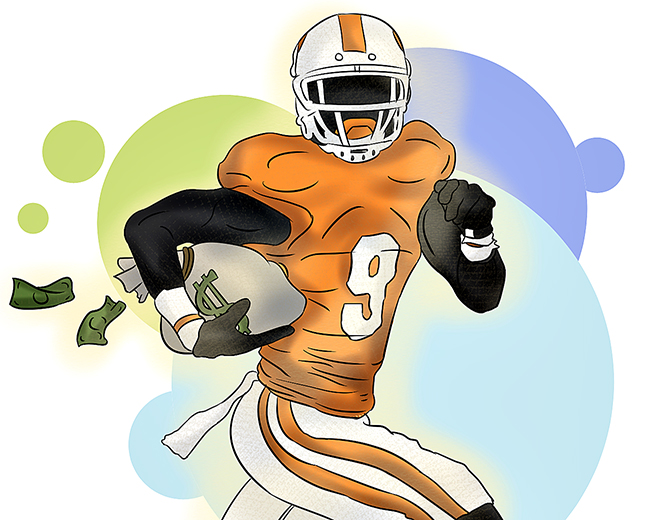Disappointed Dallas Cowboys fans cannot magically make the football season start over. If they wish to throw some money away, though, they can reset their fantasy football season.
Fantasy football has long been played in a season-long format parallel to the pros, where players build their teams by divvying out athletes among their fantasy league before the season starts. From there, certain statistics turn into points. The game is more than a competition, it is a social experience: The first event I attended after arriving at UT was a fantasy football draft just like that.
If you have watched sports on television in the past few months, however, you might have noticed that fantasy sports have changed. Daily fantasy sports site DraftKings spent $22,535,747 on 6,053 ads on the first weekend of the professional football season alone. Hate them or not, there is no avoiding this explosion of daily fantasy sports.
These games operate in a fundamentally different way than their season-long cousins. Daily fantasy sports games allow players to build a one-time team based on a budget and tiered player contract system. These games are not about picking players who will score the most points, but players who provide the best value for their cost.
Up to 229,000 players will enter a DraftKings contest with a top prize of $1 million this weekend, but this game is not designed for the majority of football fans. Optimizing lineups requires accurate performance projections, which many fans just do not have. The most successful players devise elaborate player performance models and then hedge their bets with thousands of entries.
While DraftKings and FanDuel tell fans that anyone can win, the truth is much different. A study conducted last summer found that 91 percent of the player profits were won by just 1.3 percent of players. Eighty-five percent of all players are losing more than 30 percent of their entry fees.
This means these sites sit in a precarious legal state. Nevada and New York recently banned these sites on the basis that they are gambling. But if they are “skill-based games,” like the sites say, then they are not gambling and, therefore, legal. Earning inequality suggests there is skill, but that skill seems to be modeling and money.
Either way, the dangers of daily fantasy as it currently exists are very real. Regardless of superficial characteristics that lend the appearance of a skill-based game, people use these sites for activites similar to gambling, and they cheat people who are not wealthy enough to win out of money.
For that reason, regulation of daily fantasy sports needs to be a serious political issue. While it is not necessary for presidential candidate Jeb Bush to brag about his team’s record, how he approaches the regulation of an unfair market is. This is what daily fantasy has become, and politicians need to address it as such.
These games themselves are ultimately somewhat unimportant. It does not matter who won their fantasy league last year, but it does matter that citizens are protected from websites that will take their money in bad faith. While fans cannot change Dallas’ football fortunes all that much, they can choose their own. It is time to make sure they do.
Chase is a Plan II and economics junior from Royse City. Follow him on Twitter @alexwchase.





















